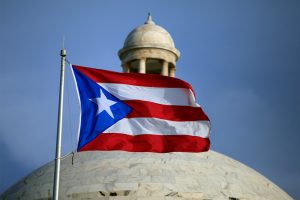By: Alejandro Anselmi Gonzalez, 2L
The United States has been in possession of Puerto Rico since 1898. Since then, Congress, under authority conferred by the Territory Clause, has passed multiple laws incorporating Puerto Rico into the American constitutional framework. For instance, the Foraker Act of 1900 established a civilian government in Puerto Rico; the Jones-Shafroth Act of 1917 granted U.S. citizenship to Puerto Ricans; and Public Law 600 of 1950 granted the Puerto Rican government permission, in recognition of “the principle of government by consent,” to draft its own constitution. The establishment of the Commonwealth of Puerto Rico, which is neither an independent nation, nor part of the Union, was the culmination of this progression.
As such, Puerto Rico does not receive equal treatment as the States and is subject to certain kinds of legal discrimination, like shipping. Since 1967, Puerto Rico has held five plebiscites about the Island’s political status. Amid calls for boycottsfrom major political parties and a turnout of only 23%, the plebiscite of 2017 showed 97.2% of voters opted for statehood. However, even if Puerto Ricans were to unambiguously express a desire to join the Union, Congress is not obligated to acquiesce. In Commonwealth of Puerto Rico v. Sanchez Valle, dealing with the applicability of the Double Jeopardy Clause, the Supreme Court explained that “the oldest roots of Puerto Rico’s power to prosecute lie in federal soil” because the “ultimate source” of Puerto Rico’s constitutional authority lies in federal law. As a function of Public Law 600, authorizing the creation of Puerto Rico’s constitution, only Congress can alter Puerto Rico’s political status.
Accordingly, Rep. Nydia Velázquez introduced H.R. 8113, the Puerto Rico Self-Determination Act of 2020. The bill aims “to establish a mechanism for congressional consideration” of Puerto Ricans’ “natural right to self-determination.” Consequently, the bill calls for the assembly of a status convention in the Island, consisting of “delegates elected by Puerto Rican votes” and only dissolvable when Congress approves a self-determination “option” presented to it by convention.
However, this is not the first bill to be introduced that deals with the adjustment of Puerto Rico’s political status; preceding bills either did not survive a vote or became stuck in committees. Notwithstanding that the Republican platformespouses statehood for Puerto Rico, Senate Republicans have expressed their opposition to Puerto Rican statehood because it would dilute their numbers in that chamber, even though the Island may be more politically “purple” than “blue.” Importantly, Jennifer González, Puerto Rico’s sole representative to Congress and a proponent of statehood, is a Republican, placing her in a contradictory position as a standard bearer for the equal treatment of Puerto Ricans and a supporter of the GOP. Additionally, H.R. 8113 has been criticized by supporters of statehood for Puerto Rico, highlighting that the bill is unnecessary because Puerto Ricans have already opted for statehood various times. Moreover, the proposed assembly would exclude the voice of many Puerto Ricans because of its “closed door” assembly approach and likely delay any action by Congress.
The future of H.R. 8113 is uncertain, and a lot depends on whether Democrats are able to win the Presidency and the Senate and defend the House. Similarly, opponents’ arguments against the bill face the challenges of Puerto Rico’s diluted sovereignty, as explained in Sanchez Valle, because any plebiscite result will not bind Congress to any path of action.





